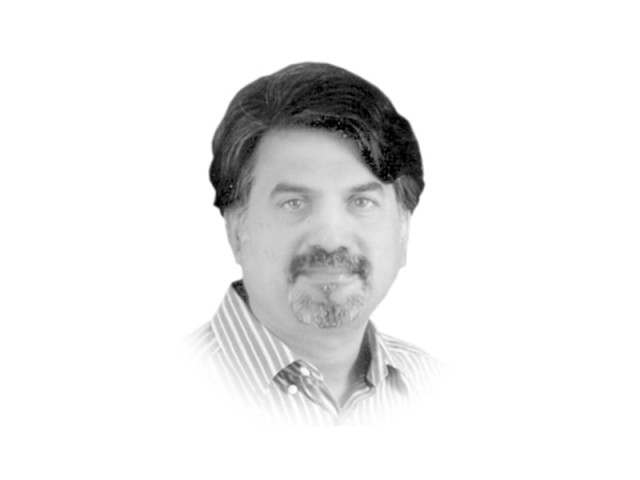The creeping evil of the Islamic State
IS can't pose the kind of military threat in Pakistan like in other countries, but can initiate spell of brutality

The writer is a retired lieutenant colonel of the Pakistan Army and is currently pursuing PhD in
civil-military relations from the University of Karachi
The danger posed by the IS is not just limited to the regional context. Out here in our part of the world, Hafiz Saeed Khan, a former Taliban commander, has already sworn an oath of allegiance (January 2015) to the self-proclaimed caliph of the IS, Abu Bakr al-Baghdadi. He now acts as the wali (governor) of the province of Khorasan — an area supposedly comprising Pakistan, Afghanistan and parts of Central Asia and Iran. There is no doubt that the IS leadership is already in place here, but does it have the ability and the capacity to execute the IS model of governance in our region? The so-called governor may have appointed a Shura Council, he may have been assured of assistance by the self-proclaimed caliph (a regular practice on swearing allegiance), he may also have set his eyes on the territory he wishes to control, but does he have any political structure or an army to exercise proper control? In Pakistan, the best IS can do is to replicate the plan that it is executing in Saudi Arabia — to create divisions within the country by executing sectarian attacks. Although the IS’s stated mission is “to put an end to the Jewish state, the Saudi monarchy, the rest of the apostate and the allies of the cross”, it is its non-stated aim of deliberately instigating a sectarian war that can prove to be extremely dangerous for countries like Pakistan. Jundullah was the first group in the country to have sworn allegiance to the IS, and given the many sectarian terror groups operating here, there could be more such oaths of allegiances in the future.
Policymakers must take note of the possible sectarian direction of the IS action in Pakistan. They must move beyond the ‘assessment phase’. They know which targets could be most vulnerable to a possible IS action, so keeping that in mind, policymakers must build a comprehensive plan to meet the threat in the foreseeable ‘engagement phase’. Two statements in recent times have suggested divergent views on the emergence of the IS threat in Pakistan. Corps Commander Peshawar Lieutenant General Hidayatur Rehman, speaking to journalists in March, had stated that the IS poses no threat to Pakistan. He had also said that “there is no need to fret about the IS or its potential emergence in the country; for us it is just the change of name and there is no need for Pakistanis to worry”. Foreign Secretary Aizaz Ahmed Chaudhry, on the other hand, while recently addressing the Senate Standing Committee on Foreign Affairs referred to the IS as “indeed a real concern”, and assured those present that the “government will take all steps necessary to counter the threat”.
It should be clear here that the name that the IS chooses to operate under in Pakistan is not important. The thing that is important are its goals, which should worry both our military and civilian establishments. The IS cannot pose the kind of military threat in Pakistan like it does in some other countries, but it sure can initiate a spell of organised brutality and cruelty through its client militant groups. Termed “a brutal, sectarian and apocalyptic organisation that is the crack cocaine of violent extremism” by Jessica James and J M Berger in ISIS: The State of Terror, this group is no friend to humanity, let alone of the followers of Islam. The Pakistani state needs to put up a sound defence against groups that subscribe to its violent ideology and it can start that by taking action against those that have already sworn allegiance to the IS. Take the fight to such elements before they bring the fight to us. Punish them so severely that all other similar groups are deterred from making the choice that these elements made. Allowing such groups any sort of time or space will only embolden them.
Military planners are well aware of the failed balancing strategies of the past, like hedging, containment, appeasement and even accommodation that were deployed when dealing with the Taliban. APS Peshawar was left unprotected even though there were indications that it could be under threat and the result was a national tragedy. We have initiated security measures in the wake of this tragedy in all our schools, but the damage has already been done. The IS can hurt us and our national pride in the same way by launching sectarian attacks in a manner similar to the way the Taliban attacked our schoolchildren. For now, the least the state can do is to ensure that all places of assembly and worship are resolutely safeguarded. This, hopefully, will be done right away and not after the loss of more innocent lives.
Published in The Express Tribune, July 10th, 2015.
Like Opinion & Editorial on Facebook, follow @ETOpEd on Twitter to receive all updates on all our daily pieces.















COMMENTS
Comments are moderated and generally will be posted if they are on-topic and not abusive.
For more information, please see our Comments FAQ